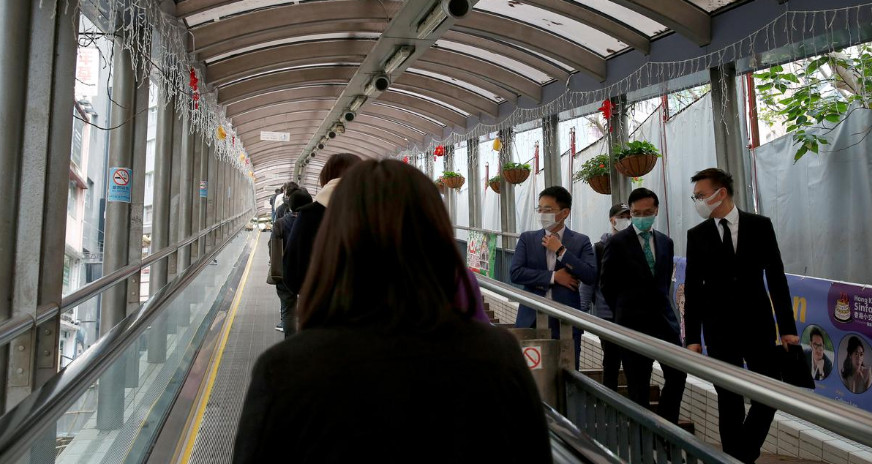HK: Why the post-Covid environment would stay harsh

Many of us remember the terrible time in early-mid 2003 when SARS hit Hong Kong. As with Covid-19 today, schools were closed (at least for a while), tourist arrivals went down to almost nothing, and retail businesses like hotels and restaurants saw turnover collapse.
The human cost was severe, with 299 deaths in Hong Kong. The economic outlook was extremely gloomy. Unemployment numbers rose, and the stock market plummeted.
To many people’s surprise, an economic recovery followed quite soon. The government and private sector rushed through various measures to get the city back on its feet again – like the “Harbor Fest” series of musical performances.
But even by the time those concerts took place, six months after the SARS outbreak had been at its height, the economy was visibly getting back to normal.
It was an example of how resilient and flexible our economy can be. And it would be tempting to hope that something similar might happen this time.
The big difference of course is that Covid-19 has been a global outbreak, with major Western economies among the worst hit.
Hong Kong bounced back after SARS because the rest of the world had been carrying on pretty much as usual.
The global economy was recovering from the slowdown of a few years earlier, and regional economies had already bounced back from the Asian financial crisis. The Mainland economy was booming. On top of that, the opening up of outbound Mainland tourism gave a direct boost to Hong Kong’s retail and hotel industries.
Hong Kong’s economy actually grew 3.3% in 2003 as a whole – one percentage point more than in the previous year.
The post-Covid environment is probably going to be very different.
The whole world is currently suffering a serious economic setback. The IMF is forecasting global GDP to shrink by 3% for 2020 as a whole – and that’s if the pandemic peaks in the second quarter. In this optimistic scenario, there could be a rebound of over 5% global GDP growth in 2021.
However, if the pandemic continues in the second half of 2020 – or if it comes back in 2021 – the IMF predicts a second year of global contraction.
Even in the best case, the outlook for Hong Kong looks bad. Consumption in most major economies will be weak, so trade will suffer. Mainland and other manufacturing centers will have capacity to spare, so investment flows will be weak. Travel and transport will also be hit by quarantines and other restrictions on cross-border movement. The only bright note is that we have plentiful fiscal reserves – which can provide a temporary cushion.
It might be that the forecasters are too pessimistic – just as Hong Kong officials and business leaders were in April-May of 2003. But we can’t count on that.
We should all prepare ourselves for at least a medium-term contraction in Hong Kong. We should also think in terms of adjusting to some permanent changes in the shape of our local economy and the external environment.
The mainland is bound to go through a period of lower export demand, higher unemployment and slower growth. For Hong Kong, this suggests we will have to undergo some visible changes as parts of our economy rebalance. Examples could be our logistics industry and sectors that rely on mass tourism and mainland shoppers.
Further ahead, we can expect some important – and positive – new trends in the mainland economy. McKinsey is predicting far greater digitalization in areas like retailing and personal services, the rise of an affluent younger generation of consumers and savers, and the growing importance of the domestic market (and a decline in exposure to the global market).
This will be a real test of our flexibility. There could be significant opportunities for Hong Kong as the mainland – and especially Bay Area – economy adjusts and develops in new directions. Mainland demand for more sophisticated financial services is one example of a sector with tremendous potential for local expertise.
We must also prepare to adjust to some bigger shifts in the way we live or work – perhaps in areas like working from home, adopting higher levels of health awareness, or travelling less overseas for leisure or business.
After SARS, we were able to go back to normal relatively easily. That will not happen this time. The key question for Hong Kong – which has come to rely heavily on particular sectors – is whether we can embrace change.
-- Contact us at [email protected]
-

Equip young people for the future Dr. Winnie Tang
In late February, the inaugural flight of an air taxi from Shenzhen Shekou Cruise Homeport to Zhuhai Jiuzhou Port took only 20 minutes with an estimated one-way ticket price of 200 to 300 yuan per
-

Are we raising a generation of leaders, or of followers? Brian YS Wong
The essence of education is defined not by the facts it imparts, but the potential knowledge it inspires students to individually pursue on their own. Put it this way – the ideal form of education
-

The urgent need for reforms to sex education in Hong Kong Sharon Chau
Nearly one in every four university students (23%) in Hong Kong has been sexually harassed, according to a 2019 report published by the Equal Opportunities Commission (EOC). A 2019 study found that
-

STEAM should be linked to real life Dr. Winnie Tang
In the 2017 Policy Address, STEM (science, technology, engineering and mathematics) education was proposed as one of the eight major directions to promote I&T development. Since then, funding has
-

Let trees speak for themselves Dr. Winnie Tang
I often say that smart cities start with smart planning, but smart planning presupposes adequate, systematic and up-to-date data. This is important not only for city administration, but also for tree















